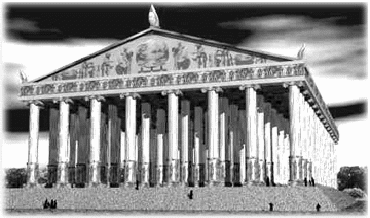 Part
5 The Temple of
Satan
Part
5 The Temple of
Satan Part
5 The Temple of
Satan
Part
5 The Temple of
Satan
The Hasmonians had already mixed the left and right hands of government a century before. They had the power to do so because the voice of the people had already chosen a central government that had grown powerful and arbitrary, while the people became more subject and impotent. Some were discovering the ancient paths and some remained rooted in their Jewish religious fables, national pride, and decadent affluence.
About 78 BC, the Pharisees, which were a political party, thought they had a better idea. They decided to exercise authority over the people. They managed to enact a law upon the people to enforce the collection of temple tribute.1 The right hand of government used its power on the left side of God’s Kingdom, thereby increasing both sides, while, at the same time, reducing the position of the people. Not only were the people drained of funds, but they also lost the maturing benefit of exercising the responsibility and right to choose.
The hand of the diligent shall bear rule: but the slothful shall be under tribute. Pr 12:24
At first, wealth was plentiful and the money flowed in the fluid halls of commerce, but, again, with the taxation, corruption, and the moral dissipation of the people, new sources of revenue for government were introduced. The practice in Rome of selling tax-collection contracts to companies and their joint stock holders was common, but, in the last years of the millennium, Augustus put the tax collectors on the public payroll, which evolved into something very similar to modern tax agencies and continued during the rest of the New Testament period and beyond. These lucrative positions often went to the person who could extract the most funds, not content with their wages, and often taking by force.
Administrating these complex programs in Judea was done by many officers of government. There was now a need for professional lawyers to interpret the law. These became officers of the Jewish court, giving their opinion as law, regulating the accounting and payment of taxes. More power meant more laws. The more people became dependent on the lawyers, the less they understood the law.
“The more corrupt the state, the more laws.” Tacitus
Scribes filled a number of positions. The Greek word for “scribe” was grammateus, meaning “a clerk, scribe, esp. a public servant, secretary, recorder, whose office and influence differed in different states.” They were the clerks or clerics in a complex system of accountants and lawyers.2 In the Talmud, there is a distinction between two classes of the tax-collectors, the Gabbai and the Mokhes or Mokhsa.
“The Gabbai, or tax-gatherer, collected the regular dues, which consisted of ground [property tax], income [income tax], and poll tax… If this offered many opportunities for vexatious exactions and rapacious injustice, the Mokhes might inflict much greater hardship upon the poor people. There was a tax and duty upon all imports and exports; on all that was bought and sold [sales tax]; bridge money, road money, harbor dues, town dues, etc. The classical reader knows the ingenuity which could invent a tax and find a name for every kind of exaction, such as on axles, wheels, pack animals, pedestrians, roads, highways; on admission to markets; on carriers, bridges, ships, and quays; on crossing rivers, on dams, on licenses-- in short, on such a variety of objects that even the research of modern scholars has not been able to identify all the names. But even this was as nothing compared to the vexation of being constantly stopped on the journey, having to unload all one’s pack animals, when every bale and package was opened, and the contents tumbled about, private letters opened, and the Mokhes ruled supreme in his insolence and rapacity.”3
1Salome- Alexandra (about 78 BC), that the Pharisaical party, being then in power, had carried an enactment by which the Temple tribute was to be enforced at law. Alfred Edersheim’s book The Temple.
2Matthew 22:35 Then one of them, which was a lawyer, asked him a question, tempting him, and saying, Luke 7:30 But the Pharisees and lawyers rejected the counsel of God against themselves, being not baptized of him. Luke 10:25 And, behold, a certain lawyer stood up, and tempted him, saying, Master, what shall I do to inherit eternal life? Luke 11:46 And he said, Woe unto you also, ye lawyers! for ye lade men with burdens grievous to be borne, and ye yourselves touch not the burdens with one of your fingers. Luke 11:52 Woe unto you, lawyers! for ye have taken away the key of knowledge: ye entered not in yourselves, and them that were entering in ye hindered.
3Edersheim, Life and Times of Jesus.